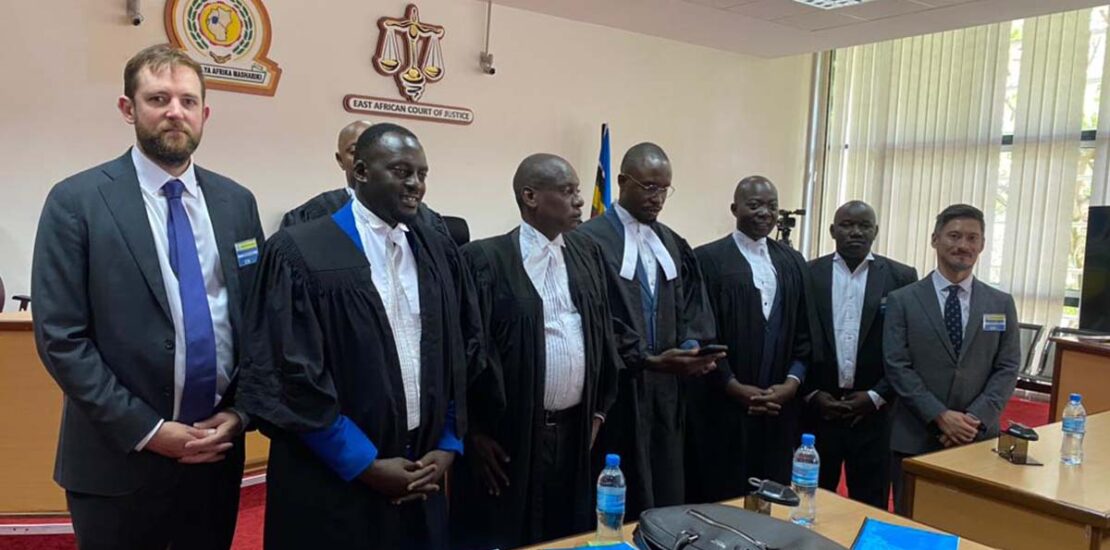EACOP Case: Challenging Human Rights and Environmental Violations in East Africa
- August 7, 2025
- Posted by: CEFROHT Reporter
- Category: Social Justice

The Center for Food and Adequate Living Rights (CEFROHT), alongside other Civil Society Organizations (CSOs) from East Africa, filed a public interest case at the East African Court of Justice (EACJ) against the Attorney General of Uganda, the Attorney General of Tanzania, and the Secretary General of the East African Community. The case addresses violations of Project Affected Persons’ rights, environmental and biodiversity protections, riparian rights, and breaches of the African Charter and East African Community Treaty and protocols.
According to Oxfam’s human rights impact assessment, Environmental Impact Assessment (EIA) reports, the EU resolution, and the Advisory Review of the resubmitted EIA for the East Africa Crude Oil Pipeline (EACOP), the project poses significant environmental and human rights risks to communities along the proposed pipeline corridor in Uganda and Tanzania. These risks include violations of the right to livelihood due to evictions, leading to food insecurity. The construction of EACOP is also projected to cause severe environmental harm to the Lake Victoria Basin, including potential oil spills, water shortages, deforestation, and other detrimental impacts. A substantial portion of the pipeline runs near Lake Victoria as it crosses into Tanzania, threatening a critical water source for millions in East Africa.
Experts estimate that EACOP could produce 34 million tons of carbon dioxide emissions annually, contradicting Uganda’s commitment to reduce greenhouse gas emissions by 22% by 2030. The project would increase Uganda’s emissions by over 150%.
The case is currently on appeal before the Appellate Division of the East African Court of Justice, with the latest hearing held on February 24, 2025, in Kigali. The bench comprised Justices Nestor Kayobera, Kathurima M’Inoti, Anita Mugeni, Barishaki Bonny Cheborion, and Omar Othman Makungu. Present in court were the CSOs (appellants), their legal representatives, EACOP representatives, oil project-affected persons from Uganda, and lawyers for the respondents, including the governments of Uganda and Tanzania and the EAC Secretary General.
During the hearing, the appellants’ counsel argued the following:
- The Tanzanian government provided conflicting evidence on the signing dates of the Intergovernmental Agreement (IGA) and Host Government Agreement (HGA) for EACOP.
- A preliminary objection cannot stand where evidence conflicts.
- The CSOs filed their case within the stipulated timeframe under Article 30 of the EAC Treaty.
- The First Instance Court improperly evaluated evidence while ruling on a preliminary objection.
- If the court dismissed part of the case as time-barred, it should have adjudicated the remaining valid claims.
- Awarding costs to the respondents discourages public interest litigation and undermines treaty enforcement efforts.
The appellants urged the appellate court to overturn the First Instance decision and order a hearing on the merits.
Key Arguments
Dr. David Kabanda, representing the CSOs, stated: “We appealed the preliminary objection raised by the Tanzanian Solicitor General, who claimed the case was time-barred. This court prohibits preliminary objections requiring evidentiary examination. The First Instance Court improperly reviewed evidence before ruling.” Dr. Kabanda leads CEFROHT, one of the appellant organizations, alongside AFIEGO (Uganda), Natural Justice (Kenya), and the Centre for Strategic Litigation (Tanzania).
Mr. Justin Semuyaba, another CSO lawyer, argued: “We seek to correct the First Instance Court’s erroneous dismissal based on jurisdiction. Article 30 of the EAC Treaty allows residents to challenge unlawful actions within two months of discovery. The appellants filed in November 2020 after learning of the EACOP agreements in October 2020—well within the deadline.”
Dr. Rugemeleza Nshala urged the court to reverse the costs awarded to the respondents, warning: “Costs create a chilling effect, deterring public interest litigation. This case impacts countless individuals, as evidenced by today’s courtroom attendance.”
Ms. Joan Kembabazi added: “Pursuing such high-stakes litigation requires immense courage. Imposing costs would discourage future cases.”
Pending Ruling
Following arguments from both sides, Justice Kayobera announced that the ruling would be delivered on notice. If the appellate court agrees with the CSOs, the case will return to the First Instance Division for a merits-based hearing.
Reactions
After the hearing, Mr. Dickens Kamugisha, CEO of AFIEGO, urged Uganda and Tanzania to prioritize climate action: “African nations, as vulnerable states, must lead by avoiding climate-wrecking projects. Only then can they demand accountability from high-polluting countries.”
